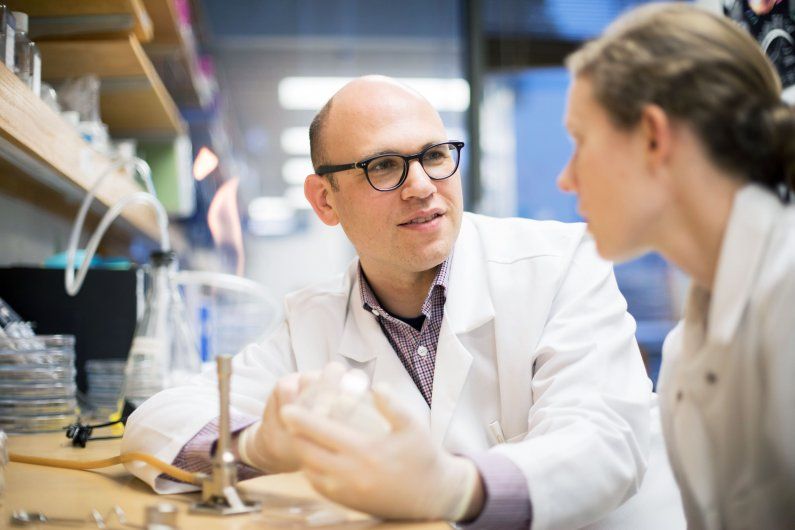Industry Partnerships
In recent years, UCSF has revamped and streamlined its approach to industry partnerships to help move research more quickly and strategically from the laboratory to clinical trials and patient treatment.
These efforts are led by Innovation Ventures, under the direction of Barry Selick, PhD, vice chancellor for Business Development, Innovation & Partnerships. Innovation Ventures' goal is the ensure the best new therapies and technologies can make their way to the patient as efficiently and safely as possible. They do this by working with researchers to develop their ideas, and working with industry and investors for research collaborations or licensing of UCSF innovations.
The many industry partnerships across UCSF include:
Facebook: UCSF was among the first universities to join an innovative development model sponsored by Facebook’s Building 8, a venture that “applies DARPA-style breakthrough development at the intersection of science and products.” The Sponsored Academic Research Agreement (SARA), launched in 2016, allows UCSF and Facebook researchers to engage in joint technology projects without the usual red tape.
Pfizer: A 2013 partnership with Pfizer's Centers for Therapeutic Innovation provides investigators from UCSF with access to Pfizer’s industry-leading small-molecule drug development capabilities, working side-by-side with Pfizer scientists with the goal of jointly translating promising basic research into drug candidates that have the potential to bring innovative new therapies to patients. The collaboration built upon a 2010 agreement between CTI and UCSF in large-molecule – also called biologics – discovery.
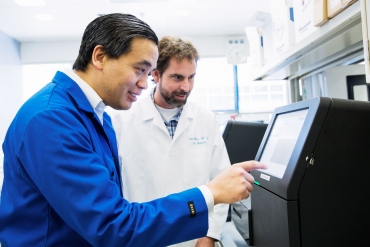
Abbott Diagnostics: A multiyear, collaborative agreement between UCSF and Abbott led to the UCSF Viral Diagnostics and Discovery Center, which focuses on detection and discovery of novel viruses associated with acute and chronic human illnesses. Researchers anticipate further partnerships that will help unlock the viral causes of unexplained acute illnesses such as respiratory infections, gastroenteritis and encephalitis, as well as chronic illnesses such as cancer.
GE Healthcare: The formation of the Surbeck Laboratory for Advanced Imaging at Byers Hall on the Mission Bay campus in 2005 enhanced the long term collaboration between UCSF and GE Healthcare with regard to the development of novel magnetic resonance imaging technologies. In 2016, UCSF's Center for Digital Health Innovation launched another partnership to develop a library of deep-learning algorithms that will focus on high-volume, high-impact imaging to create algorithms that reliably distinguish between what is considered a normal result and what requires follow up or acute intervention.
Nikon Instruments and Technical Instruments: The Nikon Imaging Center at UCSF shows how industry partnerships can bring high-end, cutting-edge equipment to the University. In this case, 10 companies led by Nikon donated approximately $2.3 million in microscopes and other devices to a joint QB3-UCSF School of Medicine facility for light microscopy.
Genentech: Now a member of the Roche Group pharmaceutical company, Genentech has more than 15 research collaborations with UCSF across several therapeutic areas. Under a 2010 partnership agreement, Genentech is supporting the work of UCSF researchers in the Small Molecule Discovery Center, with both funding and research acumen in neuroscience, and the two teams are working together to discover and develop drug candidates for neurodegenerative diseases.
Community Partnerships
Consistent with its mission as a public university, UCSF is committed to forging fruitful relationships that provide support to and strengthen the community at large.
The UCSF Clinical and Translational Science Institute (CTSI) leads many of the University's community partnership efforts through its Community Engagement and Health Policy Program. The program aims to bridge academic research, health policy, and community practice to improve public health, and its goals are to:
- Increase community participation in all stages of research to improve research-based practice and stimulate practice-based research.
- Provide research and guidance for policy changes at the local, state and national levels.
- Foster strong relationships for research collaboration between community health providers, policy makers, and academic researchers.
- Identify key research opportunities and support the development of useful research tools.
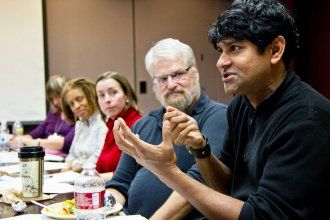
The San Francisco Health Improvement Partnership (SFHIP) joins public, nonprofit and private stakeholders to improve public health. Photo by Susan Merrell
As part of this effort, CTSI hosts the Center for Community Engagement, formerly called University Community Partnerships, which works to strengthen the University’s connection with the community and to empower the community to work with the University. The emphasis is on collaboration that values and respects the assets and diversity of both.
Two initiatives by the Community Engagement and Health Policy Program are:
- San Francisco Health Improvement Partnership (SFHIP), a citywide effort rallying the San Francisco Department of Public Health, San Francisco Unified Public School District, the Mayor's Office, as well as nonprofit and private stakeholders. The underlying premise for establishing SFHIP is that by working together in a coordinated, focused, and well-informed manner, groups can achieve synergies and foster innovation to achieve more substantial gains in community health and health equity. UCSF has worked with SFHIP to identify four priority areas for developing community interventions based on research conducted here: physical activity and nutrition, alcohol policy, children's oral health, and hepatitis B.
- San Francisco Bay Area Collaborative Research Network (SF Bay CRN), a practice-based research network designed to encourage, facilitate and lead mutually beneficial practice-based research partnerships between UCSF researchers and community-based primary health care organizations, practices, and clinicians in the San Francisco Bay Area and Northern California. The network provides consultation, linkage and pilot funding.
The UCSF Helen Diller Comprehensive Cancer Center also leads a citywide collaboration that aims to reduce cancer in San Francisco by engaging health care systems, government, community groups and residents.

Bob Hiatt (left), MD, PhD, and Kirsten Bibbins-Domingo (center), PhD, MD, MAS, at the launch event for the San Francisco Cancer Initiative at City Hall in 2016. Photo by Noah Berger
The San Francisco Cancer Initiative (SF CAN), launched in 2016, is targeting five of the city’s most common cancers likely to be affected by known interventions or better screening. Since many of those cancers affect certain racial and ethnic minorities and the socially disadvantaged more than other groups, a primary focus of SF CAN is reducing inequities in prevention, screening rates, access to quality healthcare, and outcomes.
Global Partnerships
An internationally renowned health sciences institution, UCSF maintains a reach that goes well beyond U.S. borders. Accomplishments and contributions by UCSF basic science and clinical research teams have transformed health and health care worldwide in HIV/AIDS, malaria, tuberculosis, tobacco use, emergency medicine and numerous other areas.
At the center of international outreach is the UCSF Institute for Global Health Sciences (IGHS), which works with partners in countries throughout the world to improve health and reduce the burden of disease in the world’s most vulnerable populations. First established in 1999, the Institute for Global Health Sciences involves an innovative team of educators, researchers and health care professionals working around the world to train global health leaders and build sustainable solutions to improve health and eliminate disease.
UCSF currently has more than 600 UCSF investigators from each school conducting projects in more than 190 countries:
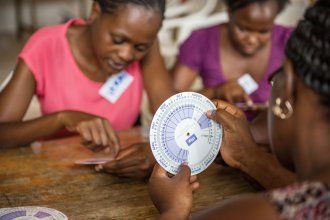
In Rongo, Kenya, hospital trainees use a chart developed through the UCSF East Africa Preterm Birth Initiative to determine how preterm a baby is. Photo by Matthew Gillooley
Africa: UCSF research mirrors the numerous and diverse sub-regions of Africa, but many projects are focused on HIV/AIDS, malaria and maternal and newborn child health. Eastern Africa has a high burden of parasitic and other infectious diseases, and has been particularly affected by the HIV/AIDS epidemic. The East Africa Preterm Birth Initiative aims to improve the quality of facility care for mothers and newborns through a package of interventions in Kenya and Uganda and group antenatal and postnatal care in Rwanda.
UCSF researchers have been actively involved with capacity building and technical assistance for HIV care and prevention in Western Africa. In Northern Africa, UCSF researchers are involved with testing hepatitis C treatment.
Asia: Much of UCSF's work is associated with the epidemiology, prevention and control of infectious disease, principally HIV, malaria and tuberculosis. For instance, The Malaria Elimination Initiative of the Global Health Group at IGHS has been working to support countries for malaria control and elimination in Asia. In the field of prevention and harm reduction, researchers have been studying substance abuse in China and Iran. Other research efforts focus on empowerment of women, improving the quality of care for maternal and reproductive health, and HIV prevention among high-risk women and girls.
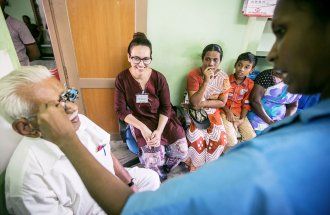
UCSF graduate student Jamen Rose Garcia observes an eye exam in a village near Madurai, India, as part of research on the world-renowned Aravind Eye Care System. Photo by Paul Joseph Brown
Europe: Though often overlooked in lists of activities pertaining to global health, European collaborations with UCSF researchers are very common. Large clinical trials studying medications for diseases such as heart disease, cancer, or HIV often include European cohorts in their studies. UCSF scientists often gain training in Europe and vice versa. UCSF researchers are part of trans-national networks that study topics as diverse as neonatal stroke and HIV and hepatitis C coinfection among people who inject drugs (PWID).
Latin America and the Caribbean: UCSF researchers are involved in a range of projects researching public health and medicine, from tracking viral pathogens in Nicaragua, to large-scale clinical trials in Mexico of medication to delay the onset of diabetes, to policy research on the prices of essential medications. The Global Strategic Information group in IGHS has been involved in PEPFAR implementation in selected regions of the Caribbean and Latin America and has hosted Fogarty scholars from Brazil.
North America: Many UCSF projects that seek to build capacity and solve research problems with a worldwide scope are based in Northern America, often on UCSF campuses and in university laboratories. Most projects addressing the science of drug screening or development to treat neglected tropical diseases are unfolding in UCSF laboratories at Parnassus or Mission Bay. Likewise, many projects that address the specific health needs or ailments of immigrants and refugees are based in the United States or Canada. The UCSF Department of Emergency Medicine has been designated a World Health Organization Collaborating Centre, the only such centre in the US. In some cases, research on topics such as the immunology of HIV infection may have implications far beyond the San Francisco clinics and laboratories where it is based.
Oceania: UCSF's Malaria Elimination Initiative and the Pacific AIDS Education and Training Center work to improve local capacity to respond to malaria and HIV in Oceania. In addition to epidemiology, prevention, and control activities related to infectious disease, UCSF researchers are investigating the genetics of schizophrenia among isolated populations in Palau and participate in international clinical trial networks that include Australian cohorts.
